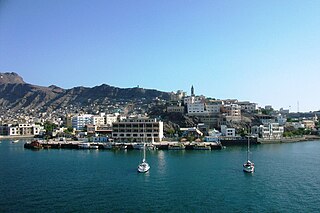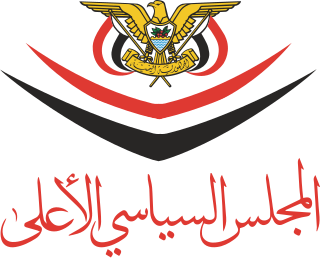
The Houthi insurgency, also known as the Houthi rebellion, the Sa'dah War, or the Sa'dah conflict, was a military rebellion pitting Zaidi Shia Houthis against the Yemeni military that began in Northern Yemen and has since escalated into a full-scale civil war. The conflict was sparked in 2004 by the government's attempt to arrest Hussein Badreddin al-Houthi, a Zaidi religious leader of the Houthis and a former parliamentarian on whose head the government had placed a $55,000 bounty.

The Houthi movement, officially known as Ansar Allah, is a Shia Islamist political and military organization that emerged from Yemen in the 1990s. It is predominantly made up of Zaidi Shias, with their namesake leadership being drawn largely from the Houthi tribe.

Bilateral relations between Iran and Saudi Arabia have been strained over several geopolitical issues, such as aspirations for regional leadership, oil export policy and relations with the United States and other Western countries. Diplomatic relations were suspended from 1987 to 1990, and in 2016 for seven years following certain issues like the intervention in Yemen, Iran embassy bombing in Yemen, incidents in 2015 Hajj, the execution of Nimr al-Nimr, the attack on the Saudi diplomatic missions in Iran. However, in March 2023, after discussions brokered by China, Iran and Saudi Arabia agreed to reestablish relations.

The Cabinet of Yemen refers to the governing body of the internationally recognized government of the Republic of Yemen, led by its President Rashad al-Alimi, who is also the chairman of the Presidential Leadership Council (PLC), the governing body of Yemeni republic.

Abdul-Malik Badruldeen al-Houthi, also known as Abu Jibril, is a Yemeni politician and religious leader who serves as the leader of the Houthi movement, a revolutionary movement principally made up of Zaidi Muslims. His brothers Yahia and Abdul-Karim are also leaders of the group, as were his late brothers Hussein, Ibrahim, and Abdulkhaliq. Abdul-Malik al-Houthi is the leading figure in the Yemeni Civil War which started with the Houthi takeover in Yemen in the Saada Governorate in northern Yemen.

The siege of Dammaj began in October 2011 when the Houthis, a Zaydi-led rebel group which controls the Sa'dah Governorate, accused Salafis loyal to the Yemeni government of smuggling weapons into their religious center in the town of Dammaj and demanded they hand over their weapons and military posts in the town. As the Salafis refused, Houthi rebels responded by imposing a siege on Dammaj, closing the main entrances leading to the town. The town was controlled by the Houthis and the fighting was mainly centered at Dar al-Hadith religious school, which was operated by Salafis.

The Houthi takeover in Yemen, also known as the September 21 Revolution, or 2014–15 coup d'état, was a popular revolution against Yemeni President Abdrabbuh Mansur Hadi led by the Houthis and their supporters that pushed the Yemeni government from power. It had origins in Houthi-led protests that began the previous month, and escalated when the Houthis stormed the Yemeni capital Sanaa on 21 September 2014, causing the resignation of Prime Minister Mohammed Basindawa, and later the resignation of President Abdrabbuh Mansur Hadi and his ministers on 22 January 2015 after Houthi forces seized the presidential palace, residence, and key military installations, and the formation of a ruling council by Houthi militants on 6 February 2015.

The aftermath of the Houthi takeover in Yemen refers to developments following the Houthis' takeover of the Yemeni capital of Sana'a and dissolution of the government, which eventually led to a civil war and the Saudi Arabian-led intervention in Yemen.

The Battle of Aden was a battle for the control of Aden, Yemen, between Houthis rebels and Yemen Army forces loyal to Ali Abdullah Saleh on one side, and Yemen Army units loyal to Abdrabbuh Mansur Hadi and Southern Movement militias on the other side.

The Yemeni civil war is an ongoing multilateral civil war that began in late 2014 mainly between the Rashad al-Alimi-led Presidential Leadership Council and the Mahdi al-Mashat-led Supreme Political Council, along with their supporters and allies. Both claim to constitute the official government of Yemen.

On 26 March 2015, Saudi Arabia, leading a coalition of nine countries from West Asia and North Africa, launched an intervention in Yemen at the request of Yemeni president Abdrabbuh Mansur Hadi, who had been ousted from the capital, Sanaa, in September 2014 by Houthi insurgents during the Yemeni Civil War. Efforts by the United Nations to facilitate a power sharing arrangement under a new transitional government collapsed, leading to escalating conflict between government forces, Houthi rebels, and other armed groups, which culminated in Hadi fleeing to Saudi Arabia shortly before it began military operations in the country.
International reactions to the Saudi-led intervention in Yemen of 2015 were mixed. Most other Arab League nations and several Western governments backed the Saudi Arabia-led military coalition, but other governments warned against an escalation in the violent situation in Yemen.

Iran and Saudi Arabia are engaged in an ongoing struggle for influence in the Middle East and other regions of the Muslim world. The two countries have provided varying degrees of support to opposing sides in nearby conflicts, including the civil wars in Syria and Yemen; and disputes in Bahrain, Lebanon, Qatar, and Iraq. The struggle also extends to disputes or broader competition in other countries globally including in West, North and East Africa, South, Central, Southeast Asia, the Balkans, and the Caucasus.

The Supreme Political Council is an executive body formed by the Houthi movement and the pro-Houthi faction of the General People's Congress (GPC) to rule Yemen. Formed on 28 July 2016, the presidential council consists of thirteen members and was headed by Saleh Ali al-Sammad as president until he was killed by a drone strike on 19 April 2018, with Qassem Labozah as vice-president. Presently the council is headed by Mahdi al-Mashat as Chairman. The territory that it rules consists most of the former North Yemen, which united with South Yemen in 1990.
The following is a timeline of the Yemeni civil war, which began in September 2014.

The Qatar–Saudi Arabia diplomatic conflict refers to the ongoing struggle for regional influence between Qatar and the Kingdom of Saudi Arabia (KSA), both of which are members of the Gulf Cooperation Council (GCC). It is sometimes called the New Arab Cold War. Bilateral relations have been especially strained since the beginning of the Arab Spring, that left a power vacuum both states sought to fill, with Qatar being supportive of the revolutionary wave and Saudi Arabia opposing it. Both states are allies of the United States, and have avoided direct conflict with one another.

The siege of Al Hudaydah, codenamed Operation Golden Victory, was a major Saudi-led coalition assault on the port city of Al Hudaydah in Yemen. It was spearheaded by the United Arab Emirates and Saudi Arabia and has been considered as the largest battle since the start of Saudi Arabian-led intervention in Yemen in 2015.

Events of 2020 in Yemen.
Events in the year 2021 in Saudi Arabia.














